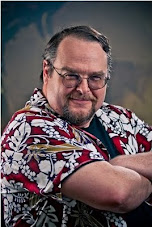Well by Lisa Kron, Directed by Braden Abraham, Seattle Rep, Through March 5.
Well. That was a bit of a mess. But I think that's the whole point.
Well is a monologue (with other people) that goes horribly and amusingly awry. It is not about the monologist and her mother, when it is, of course, totally about the monologist and her mother. It is also about racial matters, illness, being an outsider and few other things I haven't mentioned. But ultimately, it about mother and daughter.
The talented Sara Rudinoff plays Lisa Kron, who is both IRL playwrite and character in her play about putting together the play. Yeah, its very meta, and that's one of the challenges. Rudinoff/Kron sets herself up as a target at the outset, effervescing early about how this would be an "theatrical space showing the status of illness and wellness on the community and the individual" (I may be paraphrasing here). Then she starts undercutting herself by interacting with her mother.
Her mother (a fantastic Barbara Dirickson) occupies one half of the stage, her domain being a comfortable clutter of binned items for various projects, bound magazines, her favorite lazy-boy, and nostalgic age. She has been in pain most of her life, which she blames on allergies, but she is sweet, interrupting, and continually countering her daughter, whether as to her intent, the veracity of her stories, or whether the audience would want something to drink.
The other half of the stage is bare, where Kron is putting together her work, with the help of four supporting actors who are sometimes various roles, and sometimes actors. These merry elves are supposed to carry out her scenes, but they start having their own suggestions and comments. Various sets wheel and lower onto the stage, with the fussiness that becomes obvious when things start to go wrong.
And things go wrong. Kron is trying to address why some people stay sick and others get well, and cast it against her integrated community where her mom was an activist in the 60s and 70s. However, she is ultimately trying to understand why she and her mother, so similar in many ways, went different ways, where she recovered from her illnesses and her mother merely continued with them.
Kron as character loses control of the proceedings quickly, as her mother expands her own reality into the play, sweetly and relentlessly. The merry elves rebel as well, brought over to mom's side. And an childhood bully, a creature of id, appears in the midst of all this from the audience to terrify Kron further. She is creator left at the mercy of her creation, because she is not dealing honestly with them.
I think. To be fair, I don't know. The play doesn't go for easy answers or explanations (and subverts a potential happy hug moment at the end). It sort of ends where it ends, and could have gone on longer or ended a few lines back. I'm really not sure, and I'm not the only one: for this review, I cheated and looked up other comments on the play - all seemed positive, many just embraced the facile facts at the surface of the place, and a few deliver that mantra of the midwest indeterminalism - "Well, it's different".
And I came away with this: Did I have problems embracing a memoirish play where I knew that the individual portraying the monologist was not the original creator? Does monologue (even as burlesqued here) demand the authenticity of original voice? I accept actors portraying all manner of characters on the play, but strain at them portraying the author of the work? And why this work, when I had little problem with a similar conceit in the earlier "Viet Gone" (where the playwrite shows up to say that it is not about his parents (It is totally about his parents)? In short, would a Mike Daisey monologue be a Daisey monologue if I delivered it?
So put me down as puzzled on this one. Well reminds me of a performance of Six Characters in Search of an Author that I saw many, many years ago in Milwaukee. I feel I have experienced theatre, but I'm not quite sure I know what it all means.
More later,
This Cat Likes Catnip
-
So, some cats like catnip and some don't. Some really, really like it and
some can take it or leave it. And then there's some who will abandon all
digni...
2 days ago


